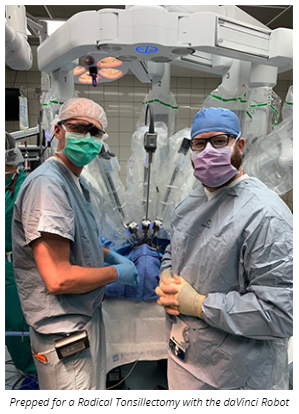How to Know You Need an ENT Clinic for Recurring Symptoms
Wiki Article
Discovering the Field of Otolaryngology: What to Expect When You Seek Advice From an ENT
Otolaryngology, generally referred to as ENT, encompasses the diagnosis and therapy of nose, throat, and ear conditions. ENT. For those experiencing relevant problems, speaking with an ENT expert can offer quality and alleviation. Understanding what to expect during such examinations is vital for reliable interaction and care. This introduction will certainly lay out key elements of the ENT experience, including usual reasons for check outs and the processes associated with medical diagnosis and treatmentComprehending Otolaryngology: A Summary
Otolaryngology, commonly described as ENT (Ear, throat, and nose) medicine, is a specific branch of medicine that concentrates on the medical diagnosis and therapy of problems impacting these essential areas of the human body. This field encompasses a wide variety of conditions, consisting of those pertaining to hearing, balance, respiratory system feature, and speech. Otolaryngologists are educated to manage both surgical and clinical therapies, utilizing advanced techniques and innovations. Their expertise expands beyond standard disorders, dealing with issues such as allergies, sinus infections, and hearing loss. Additionally, they play an essential function in the monitoring of head and neck cancers, offering complete care customized to specific client needs. Overall, otolaryngology stays important for keeping health and quality of life in damaged individuals.Common Factors to See an ENT Specialist
Numerous individuals seek the knowledge of an ENT specialist for a variety of reasons, showing the varied nature of problems that affect the throat, nose, and ear. Common issues include persistent sinus problems, which often causes relentless nasal congestion and facial discomfort. Allergic reactions and their linked signs, such as sneezing and itching, also motivate brows through to these experts. Hearing loss, whether steady or unexpected, is an additional significant reason for examination. Additionally, people may look for analysis for throat problems, including persistent hoarseness or swallowing problems. Sleep apnea, characterized by interrupted breathing throughout rest, is regularly attended to by ENT specialists too. Each of these conditions highlights the significance of specialized treatment in taking care of intricate ENT-related health problems.Preparing for Your ENT Visit
When planning for an ENT visit, it is necessary to collect pertinent information and consider any type of particular concerns. Individuals must put together an in-depth medical background, including previous ear, nose, or throat issues, surgical treatments, and present drugs. Recording signs-- such as frequency, severity, and duration-- can give valuable insights for the ENT expert. Furthermore, people need to prepare a checklist of concerns they want to ask, guaranteeing that all problems are dealt with throughout the visit. Bringing along any relevant medical documents or examination outcomes can even more aid the ENT in comprehending the patient's problem. Clients need to confirm their appointment details, including time, day, and area, to decrease any type of last-minute confusion. Correct preparation can boost the effectiveness of the appointment and result in far better end results.
What to Expect Throughout the Examination
As the examination begins, the individual can anticipate to participate in an extensive discussion with the ENT expert about their signs and case history. The expert will make inquiries about the period, frequency, and severity of symptoms such as hearing loss, nasal congestion, or sore throat. Furthermore, the person's previous medical problems, drugs, and any relevant family members background will certainly be examined, aiding the professional in forming a full understanding of the individual's health and wellness. The ENT may also ask concerning lifestyle aspects, such as exposure to irritants or allergens. This open dialogue develops a structure for the assessment, making sure that the person's concerns are addressed and setting the phase for any kind of needed evaluations or suggestions for therapy.Analysis Tests and Procedures in Otolaryngology
A range of analysis tests and treatments are essential in otolaryngology to properly review and identify problems influencing the throat, ear, and nose. Common tests include audiometry, which determines hearing feature, and tympanometry, evaluating middle ear Otolaryngology pressure. Nasal endoscopy permits visualization of the nasal passages and sinuses, while laryngoscopy checks out the throat and singing cords. Imaging methods, such as CT scans and MRIs, offer in-depth sights of head and neck structures. Allergic reaction screening may also be carried out to determine triggers for sinus or respiratory system concerns. These diagnostic devices allow ENT professionals to establish an extensive understanding of people' conditions, making sure customized and effective management plans. Appropriate medical diagnosis is vital for successful treatment end results in otolaryngology.Treatment Choices Supplied by ENT Specialists
ENT experts use a selection of therapy choices customized to deal with certain problems influencing the throat, nose, and ear. These therapies vary from conservative techniques, such as medicine and lifestyle modifications, to more invasive treatments. For example, allergic reactions may be handled with antihistamines or immunotherapy, while chronic sinus problems may need nasal corticosteroids or sinus surgical procedure. For hearing loss, ENT specialists frequently advise hearing help or surgical interventions like cochlear implants. In cases of throat problems, options can include speech treatment or operations to get rid of obstructions. Additionally, they may give support for handling sleep apnea, consisting of the usage of CPAP devices or surgical interventions. Overall, the objective is to improve individuals' lifestyle with individualized care and efficient treatment strategies.When to Seek Follow-Up Treatment With an ENT
When to look for follow-up care with an ENT specialist is crucial for managing continuous symptoms or complications connected to throat, nose, and ear problems, acknowledging. Clients need to think about setting up a follow-up consultation if signs persist in spite of first therapy, such as chronic ear discomfort, nasal blockage, or throat pain. Modifications in hearing, balance problems, or unusual nasal discharge may likewise call for more assessment. Additionally, if a patient experiences adverse effects from recommended drugs or has undertaken a medical treatment, follow-up care is very important to keep track of recuperation and address any kind of concerns. Prompt assessments can assure efficient management of problems, prevent potential difficulties, and give tranquility of mind relating to one's wellness. Seeking follow-up treatment advertises positive health monitoring in otolaryngologyRegularly Asked Concerns
What Certifications Should I Try to find in an ENT Professional?
When looking for an ENT professional, one must try to find board accreditation, appropriate experience, and solid individual evaluations. Furthermore, effective communication skills and a compassionate method can significantly improve the overall therapy experience.How Do I Select the Right ENT for My Needs?
Selecting the ideal ENT professional involves reviewing their credentials, experience, and patient evaluations. It is crucial to consider their communication design and method to treatment, ensuring they line up with the person's certain health requirements and preferences.Are There Any Type Of Risks Related To ENT Procedures?
The threats related to ENT procedures may include infection, blood loss, anesthesia issues, and potential damages to bordering structures. Patients must talk about these threats with their physician to recognize individual worries and assurance notified decisions.How Can I Handle Anxiety Before My ENT Consultation?
To handle anxiousness prior to a visit, people can exercise deep breathing exercises, visualize favorable results, prepare inquiries in breakthrough, and look for support from buddies or household, fostering a feeling of reassurance and calmness.
What Should I Do if I Experience Negative Effects From Treatment?
If adverse effects from treatment occur, the individual should immediately report them to their medical care company. ENT Clinic. Changes to therapy or added interventions might be required to ensure safety and performance in managing their condition. As the assessment starts, the individual can anticipate to involve in a complete discussion with the ENT specialist concerning their signs and symptoms and clinical background. These analysis tools allow ENT specialists to develop a comprehensive understanding of people' conditions, making certain tailored and effective management plans. ENT experts provide a variety of therapy options customized to resolve certain conditions affecting the throat, nose, and ear. When looking for an ENT expert, one ought to look for board accreditation, relevant experience, and strong individual evaluations. Selecting the best ENT professional involves assessing their qualifications, experience, and patient evaluationsReport this wiki page